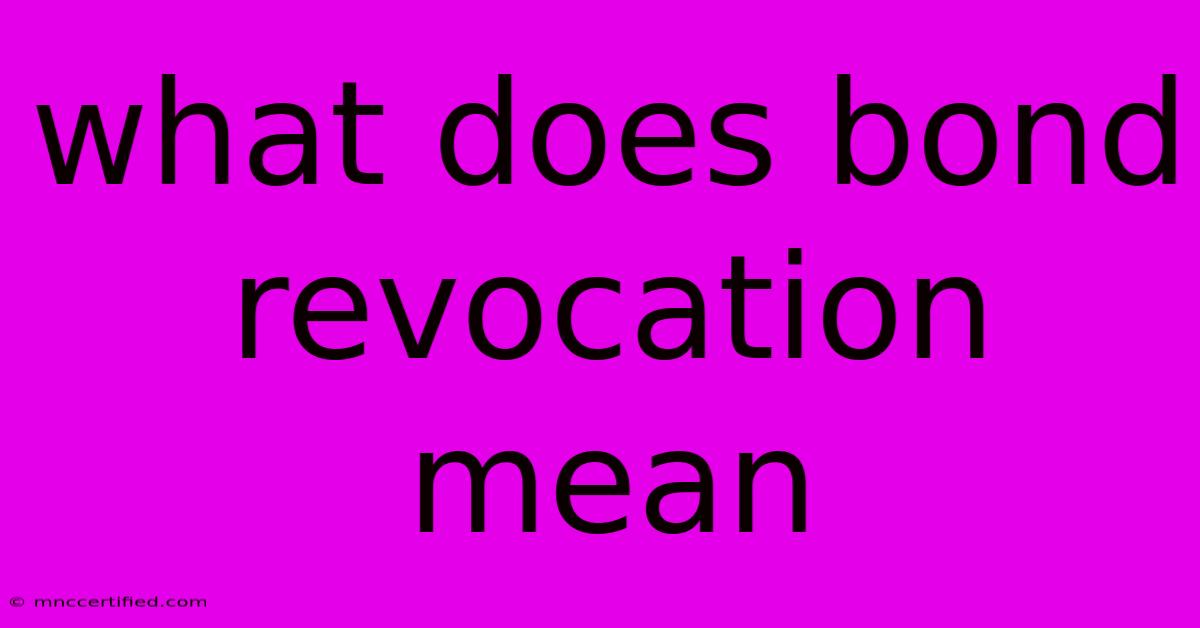What Does Bond Revocation Mean

Table of Contents
What Does Bond Revocation Mean? Understanding the Implications
Bond revocation is a serious legal matter with significant consequences for the individual involved. This comprehensive guide explains what bond revocation means, the reasons behind it, and the steps involved in the process. Understanding this process is crucial, both for those facing potential revocation and for those seeking to understand the legal system.
What is a Bond?
Before delving into bond revocation, it's essential to understand what a bond is. In the legal context, a bond, also known as bail, is a financial guarantee that an accused person will appear in court for their trial. It's a promise secured by money, property, or a surety (a third-party guarantor) that ensures the accused's presence. If the accused fails to appear, the bond is forfeited, and the money or property is seized.
What Does Bond Revocation Mean?
Bond revocation means the court has officially canceled the bond, leading to the immediate arrest of the individual who was released on bond. This action signifies that the court no longer believes the accused will appear for their scheduled court appearances. It essentially reverses the initial decision to release the individual on bail.
Key Implications of Bond Revocation:
- Immediate Arrest: The individual will be taken into custody immediately upon revocation.
- Jail Time: The accused will remain in jail until their trial or a new bond hearing is held.
- Loss of Financial Guarantee: Any money or property pledged as collateral for the bond will likely be forfeited.
- Negative Impact on Future Legal Proceedings: Bond revocation can negatively influence a judge's perception of the accused's credibility and cooperation with the legal process.
Reasons for Bond Revocation
Several factors can lead to bond revocation. These generally fall under two broad categories: violations of the conditions of release and new criminal charges.
Violations of Bond Conditions:
- Failure to Appear (FTA): This is the most common reason for bond revocation. Missing a court date demonstrates a disregard for the legal system and raises concerns about the accused's willingness to cooperate.
- Violation of Curfew: If the bond conditions include a curfew, breaking it shows a lack of compliance with court orders.
- Contact with Witnesses or Victims: This is a serious violation that threatens the integrity of the legal proceedings.
- Drug or Alcohol Use: If the bond conditions prohibit substance abuse, a positive drug or alcohol test can lead to revocation.
- New Criminal Charges: Being arrested for a new crime, even a minor offense, can result in bond revocation for the original case.
New Criminal Charges:
Being charged with a new crime while out on bond demonstrates a continued disregard for the law and significantly increases the risk of flight. This often results in immediate bond revocation.
The Bond Revocation Process
The process varies depending on the jurisdiction and the specific circumstances. However, it typically involves the following steps:
- Filing of a Motion: A motion to revoke the bond is typically filed by the prosecution.
- Hearing: A hearing is scheduled to allow the accused to present their case and explain the reasons for the alleged violation.
- Evidence Presented: Both the prosecution and the defense present evidence supporting their respective claims.
- Judge's Decision: The judge reviews the evidence and makes a decision whether or not to revoke the bond.
- Appeal: The accused may have the right to appeal the judge's decision.
How to Avoid Bond Revocation
Avoiding bond revocation requires strict adherence to the conditions set by the court. This includes:
- Regular Court Appearances: Always attend all scheduled court dates.
- Compliance with Curfews and Other Restrictions: Strictly follow any curfew, geographic restrictions, or other conditions set by the court.
- Avoid Contact with Witnesses or Victims: Refrain from any contact with witnesses or victims involved in the case.
- Refrain from Substance Use: Avoid the use of drugs or alcohol, especially if prohibited by the bond conditions.
Staying informed about legal proceedings and proactively addressing any potential problems is essential in preventing bond revocation.
Seeking Legal Counsel
If you're facing bond revocation or anticipate potential issues, seeking legal counsel immediately is critical. An experienced attorney can guide you through the process, represent your interests in court, and help mitigate the potential consequences. Understanding your rights and the potential outcomes is vital in navigating this challenging situation.
Disclaimer: This article provides general information and should not be considered legal advice. Consult with a qualified legal professional for advice tailored to your specific situation.

Thank you for visiting our website wich cover about What Does Bond Revocation Mean. We hope the information provided has been useful to you. Feel free to contact us if you have any questions or need further assistance. See you next time and dont miss to bookmark.
Featured Posts
-
Shelter Insurance Bloomfield Mo
Nov 26, 2024
-
History Today November 24 Airline Hijack
Nov 26, 2024
-
Investing In Affordable Housing
Nov 26, 2024
-
Brits Get Extra Bank Holiday
Nov 26, 2024
-
Derrick Henry Current Net Worth
Nov 26, 2024